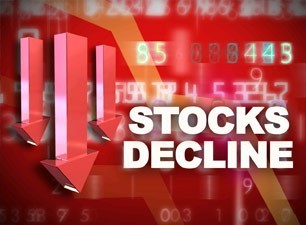Despite recent moves by the world's central banks to thaw frozen credit markets and boost investor confidence, their efforts have fallen flat as markets hurtled toward a global equity crisis.
"Selling is unstoppable in New York and Tokyo," said Yutaka Miura, senior strategist at Shinko Securities Co. Ltd. in Tokyo. "Investors were gripped by fear."
In Australia, where the S&P/ASX200 plummeted a record 8.3 percent, market watchers were calling it "Black Friday."
"It's way oversold in my opinion, and we haven't reached the bottom yet," said Roger Chandler, senior private client adviser with ABN AMRO Morgans in Sydney.
Investors across the region inundated exchanges with sell orders, dragging all benchmarks sharply lower.
Key indices in Hong Kong, Singapore, the Philippines and India were all down about 8 percent. South Korea's Kospi closed down 4.1 percent, while the Shanghai Composite Index posted a more moderate decline of 2.8 percent.
In Tokyo, Friday's gut-wrenching turmoil left individual investors shellshocked. Over the last week, the Nikkei has lost nearly a quarter of its value.
Kenji Akasaka, 69, president of a local printing company, said he had never seen it this bad in the 40 years he has traded stocks. He said he invests mainly in blue-chips including Toyota Motor Corp. and Nintendo Co., both of which have lost about half their value over the last year.
"I pray before I go to bed that the Dow will recover," said Akasaka, 69, as he scanned a monitor displaying the latest market levels. "I get sleepless, thinking about losses."
In a bid to boost liquidity, India's central bank cut the cash reserve ratio - the amount of money banks must keep on hand - by 1.5 percentage points to 7.5 percent instead of half-point, as had been previously announced. The move will release 600 billion rupees ($12.2 billion) into the financial system.
In Indonesia, authorities suspended trading indefinitely on the Jakarta Stock Exchange after they had halted trading Wednesday after the index plunged more than 10 percent.
Regulators in Russia ordered Moscow's MICEX not to open for regular trading at the usual time, and the opening of the RTS was also postponed until further notice, the state-run RIA-Novosti news agency said.
Grace Cerdenia, managing director of 2tradeasia.com in Manila, says the global sell-off is pressuring local clients to "sell even at a loss."
The benchmark Nikkei 225 index tumbled 881.06 points, or 9.6 percent, to 8,276.43, its lowest closing level since May 2003. It was its biggest one-day percentage loss since the stock market crash of October 1987.
The Tokyo bourse and the Osaka Securities Exchange briefly suspended some futures and options trading during the morning.
The regional sell-off follows a 7.3 percent plunge in the Dow Jones industrial average Thursday to close below the 9,000-line for the first time in five years. Stocks nose-dived after a major credit-rating agency said it might cut its rating on General Motors Corp. and Ford Motor Co., further rattling investors already fretting over the impact of tight credit on the economy.
The Dow's seven-day decline of 20.9 percent is the largest since the seven-day plunge ending Oct. 26, 1987, when the Dow lost 23.8 percent. That sell-off included Black Monday, the Oct. 19, 1987 market crash that saw the Dow fall nearly 23 percent in a single day.
The sluggishness in the credit markets that triggered much of the heavy selling in markets around the world since mid-September appeared little changed even after a string of interest rate cuts by central banks in the U.S., Europe and Asia this week in an attempt to resuscitate lending.
"There's no bottom to the stock markets now," said Francis Lun, general manager at Fulbright Securities Ltd. in Hong Kong. "There's no clue when it will stop."
Oil prices plummeted to a one-year low below $83 a barrel in Asia.
Analysts also said there's pressing need for the U.S. to quickly implement the $700 billion plan to buy up toxic mortgage-related securities from troubled banks and financial institutions that are at the core of problem.
In Japan, insolvencies in the insurance and real estate sectors accelerated the pessimism.
Mid-sized Yamato Life Insurance Co. went bankrupt Friday on losses related to global stock woes, while New City Investment Corp.'s bankruptcy filing made it Japan's first real-estate investment trust to fail.
Japanese Economy Minister Kaoru Yosano sought to reassure the country even as markets tumbled.
"We need to make sure that we don't get pulled too much by global tides," Yosano said. "I hope investors Japan's makes decisions calmly based on Japan's economic fundamentals."
The Bank of Japan injected 4.5 trillion yen ($45.2 billion) into the Tokyo money market Friday in its 18th straight business day of emergency liquidity operations.
Asia's falls come as finance ministers and central bankers from the Group of Seven industrialized nations prepared to meet later Friday in Washington.
"Investors are not so sure that the G7 will announce effective measures to contain the global financial crisis," Miura in Tokyo said.
In currencies, the dollar fell to 98.71 yen Friday afternoon Asia from 98.82 yen late Thursday. The euro stood at $1.3548 from $1.3560.

http://accesswdun.com/article/2008/10/214111
